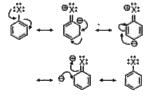In Nucleophilic substitution reactions halides are less reactive due to :
A
inductive effect in aryl halides
B
resonance stabilisation in aryl halides
C
precence of double bonds in aryl halides
D
formation of a less stable cation in aryl halides
Video Solution
Text Solution
The correct Answer is:B
Resonating structures of aryl halides are as follows.

|
Topper's Solved these Questions
- SAMPLE PAPER 05BOOK - EDUCART PUBLICATIONCHAPTER - SAMPLE PAPER 05EXERCISE - SECTION-B
23 Videos
- SAMPLE PAPER 05BOOK - EDUCART PUBLICATIONCHAPTER - SAMPLE PAPER 05EXERCISE - SECTION-C
6 Videos
- SAMPLE PAPER 04BOOK - EDUCART PUBLICATIONCHAPTER - SAMPLE PAPER 04EXERCISE - SECTION C
6 Videos
- SAMPLE PAPER 06BOOK - EDUCART PUBLICATIONCHAPTER - SAMPLE PAPER 06EXERCISE - SECTION-C
6 Videos
Similar Questions
Knowledge Check
Aryl halids are less reactive rtowards nucleophilic substitution reactions than alkyl halides due to :
Aformation of less stable carbocationBresonance stabilisationClonger carbon-halogen bondDsp2 hybridised carbon attached to halogen.Aryl halides are less reactive towards nucleophilic substitution reaction as compared to alkyl halides due to
AThe formation of less stable carbonium ionBResonance stabilizationCLonger carbon halogen bondDsp2-hybridized carbon attached to the halogenAryl halides are less reactive towards nucleophilic substitution reaction as compared to alkyl halides due to
Athe formation of less stable carbocationBresonance stabilizationClonger carbon-halogen bondDinductive effect
Aryl halides are less reactive towards nucleophilic substitution reaction as compared to alkyl halides due to
View SolutionAryl halides are less reactive towards nucleophilic substitution reaction as compared to alyl halides due to
View SolutionAryl halides are less reactive towards nucleophilic substitution reaction as compared to alkyl halides due to
View SolutionIn their nucleophilic substitution reactions, aryl halide resembles
View SolutionAssertion: Vinyl halides are reactive towards nucleophilic substitution reactions.
Reason: Reactivity is due to the polarity of the carbon halogen bond.
View Solution
